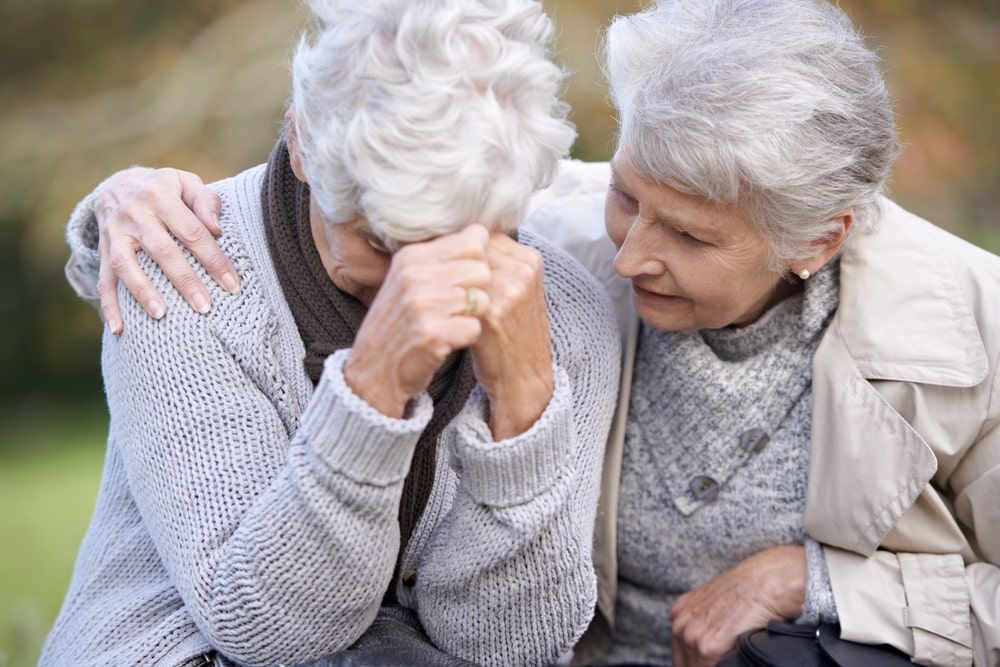If you have a friend or loved one who is dying, you’re likely dealing with a lot of feelings right now: sadness, shock, disbelief, anger, anxiety. It’s normal to experience these emotions, and you have every right to feel the way you do. As you juggle your own grief with the need to be there, physically and emotionally, for your friend or loved one, you will need to care for yourself and realize that you can’t do it all on your own. Below, we will discuss 6 self-care recommendations that will help you tend to yourself and stay emotionally stable as you care for your friend or loved one in their final days.
1. Share Your Feelings
Someone you care deeply about is dying and will soon be gone. Odds are, you will also need support as you explore your own feelings about this illness and the changes you see in your friend or loved one. Find someone who will listen to you without judgment as you talk out your own feelings. To stay available to your loved one, you need to be able to work through your own feelings. Do this with someone you trust.

Additionally, many hospices offer support groups for friends and family of the dying—both before and after the death itself. Take advantage of these compassionate resources.
2. Care for Your Body
Visiting or caring for a terminally ill person will zap a lot of your energy – both mental and physical. To make the most of the time you have left with your loved one, you need to make sure you aren’t running yourself ragged. Make sure to eat nutritious meals. Get plenty of rest. Continue to exercise. Spend time doing things that make you happy. Take a break from the sick room.

If you’re a primary caregiver, it may feel counter-intuitive or just plain wrong to take time away for self-care or to enjoy simple activities, but you will need these times to help you stay afloat. No one can sustain continuous stress, anxiety, and sadness without starting to crack. Adding a few self-care habits will help you keep it together and have the energy you need to be fully present with your loved one. Self-care has become more and more valued in our society, so make sure to take the time to do it.
3. Realize Your Own Limitations
It’s important to realize that not everyone can offer ongoing support to someone who is dying. If you feel you simply can’t cope with the situation, try to understand your reticence and learn from it. Ask yourself, “Why am I so uncomfortable with this?” and “What can I do to become more open and compassionate in times of need?”
Do not, however, avoid your friend or loved one altogether. Phone rather than visit. Write a letter or email if you can’t bring yourself to phone. Let them know that this situation is difficult for you while at the same time acknowledging that your friend or loved one’s fears and needs come first.
On the other end of the helping spectrum, don’t become obsessed with the illness or feel that you must be your loved one’s only means of support. Do not emotionally overburden yourself.
4. Establish a Routine
After a terminal diagnosis, everything may feel out of control. Your routine is upset. You are suddenly dealing with events, people, and emotions you didn’t expect. Your life has lost its normalcy and has been thrown into disarray. By establishing a routine, you can begin to gain back some of the normalcy and control you lost. When you feel comfortable in your routine, you can begin to process what’s happened and learn how to deal with and manage your feelings.

Additionally, establishing a routine will help your dying friend or loved one. They also need structure to rely on, as their life has been thrown into just as much, if not more, disarray than yours. If you are a close caregiver, establish a routine together. If you are more on the periphery, make sure to communicate your wish to visit on a regular basis and find a time that works best for both of you.
5. Embrace Your Own Spirituality
If faith is part of your life, express it in ways that seem appropriate to you during this difficult time. Pray with your friend or loved one and with their family. Allow yourself to be around people who understand and support your religious beliefs. Read spiritual verses or poems. Sing songs. Find the comfort that your faith can bring to the hard seasons of life.

If you are angry at God because of your loved one’s illness, that’s okay. Find someone to talk with who won’t be critical of whatever thoughts and feelings you need to explore. It’s normal to have questions or doubts when faced with death, but as you embrace your own spirituality, you will find the answers you need.
6. Seek Hope and Healing
As much as you may not want to face it, in time, your friend or loved one will die. To love and live wholly again, you must find a way to mourn. In fact, you cannot heal unless you openly express your grief. Denying your grief, before and after the death, will only make it more confusing and overwhelming. As painful as it may be, you must embrace your grief in order to begin to heal.
Dr. Alan Wolfelt, a nationally recognized grief counselor and author, puts it this way: “You might fall into the common thinking of our society that denying these feelings will make them go away. You might have the urge to ‘keep your chin up’ and stay busy and wait to ‘get over’ your grief. Yet, ironically, the only way to help these hard feelings pass is to wade in the muck of them. To get in and get dirty. Grief isn’t clean, tidy, or convenient. Yet feeling it and expressing it is the only way to feel whole, once again.”
Reconciling your grief will not happen quickly. Remember, grief is a process, not an event. Be patient with yourself. Never forget that the death of someone loved changes your life forever.
With these 6 self-care tips in mind, start choosing the best ways to maintain your own self-health while supporting your dying friend or loved one. More than likely, you will still be tired and emotionally worn. However, these recommendations for self-care can help prevent you from reaching burnout as you journey alongside someone you love during their final days.
*Based heavily on a brochure by Dr. Alan Wolfelt. Dr. Alan Wolfelt is a respected author and educator on the topic of healing in grief. He serves as Director of the Center for Loss and Life Transition and is on the faculty at the University of Colorado Medical School’s Department of Family Medicine. Visit www.centerforloss.com to learn more about helping a friend in grief. Published with permission.





